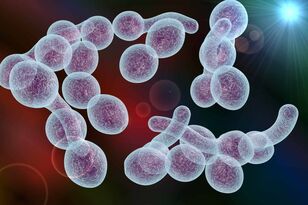In most cases, men are faced with chronic prostatitis, the development of the disease is caused by impaired blood circulation and thickening of the prostate gland. This form of inflammation is considered to be the disease of older men. About 20% of patients who come to the urology clinic are diagnosed with bacterial prostatitis - an acute form of prostatitis, regardless of age and effects of prostate gland. pathogenic microorganisms.
Causes of bacterial prostatitis

As it is understood from the name of the diagnosis, the cause of the disease is caused by bacteria entering the prostate gland by lymphatic or blood glucose.
Prostate infection with lymphatic outflow occurs with the development of various inflammatory diseases of the genitourinary system.
According to the bloodstream, the infection will enter the prostate gland in the context of serious infectious diseases such as influenza, acute tonsillitis or pneumonia.
Normally, pathogenic microorganisms enter the prostate gland through the urethra. Infections occur against the background of diseases of the genital organs.
With bacterial prostatitis, the cause lies in the activity of pathogenic bacteria, but the general state of the body is of no small importance, as the disease develops only when the immunity decreases. . The reasons for the weakening of the body's protective function:
- hypothermia;
- vitamin deficiency due to an unbalanced diet;
- antibacterial therapy;
- stress;
- reduced motivation;
- chronic infection focus;
- bad habit;
- prolonged sexual abstinence;
- promiscuous sex.
The disease is characterized by acute, rapidly increasing symptoms. Unlike congestive prostatitis, bacterial inflammation does not depend on age and occurs in young men.
Types of diseases
Bacterial prostatitis is differentiated according to the type of pathogen and the extent to which prostate tissues are involved in the inflammatory process.
Staphylococcus aureus most commonly causes prostatitis. This form of the disease is characterized by the formation of abscesses in the prostate tissue, accompanied by an increase in temperature and the release of pus from the urethra or anus. This form of the disease can be a complication of influenza, pneumonia, or the result of the presence of a chronic foci of infection in the body.
Among prostatitis-causing conditional microorganisms, E. coli and Pseudomonas aeruginosa occupy the first position in terms of prevalence. This form of the disease develops on the basis of impaired immunity. Pathogenic microorganisms enter the prostate gland along the path of lymphogenesis.
Chlamydia prostatitis is the result of indiscriminate sex. Chlamydia infection from a sexual partner is asymptomatic, however, in the context of impaired immune defenses, bacteria can enter the prostate gland, causing inflammation.
One of the most serious forms of bacterial prostatitis is fungal or candida inflammation. It develops with Candida fungal penetration into the prostate gland. The disease develops slowly and for a long time may not manifest as vivid symptoms. Most often, the inflammatory form of the fungus turns into chronic prostatitis.
Treatment of bacterial prostatitis caused by fungi requires an integrated approach, as the fungus rapidly develops resistance to the effects of antispasmodic drugs.

Candida has not been present for a long time and is difficult to treat.
Acute bacterial prostatitis can be accompanied by the formation of purulent foci. There are several types of diseases, depending on the extent to which prostate tissue is involved in the inflammatory process:
- catarrhal;
- capsule;
- parenchyma;
- prostate abscess.
The catarrhal form is characterized by inflammation of the walls of the ducts of the prostate gland. It belongs to a mild inflammatory form and is successfully treated with antibiotics for a week and a half.
Cystic prostatitis is accompanied by abscess formation in the glandular tissue. This form of disease manifests itself with a high fever but is treated with quite effective antibiotics.
In parenchymal inflammation, the pathological process spreads to the entire organ. At the same time, the prostate gland increases in size, the contour changes and edema develops. If not treated promptly, this form of the disease can develop into chronic prostatitis.
Prostate abscess is the formation of a cavity filled with pus. Due to the abscess, the fever is high and has symptoms of intoxication. When an abscess flares, immediate relief occurs, but the infiltration of purulent substances into the bloodstream can generally lead to sepsis. This form of the disease is characterized by acute pain syndrome, high body temperature and severe body poisoning. An abscess is opened by surgery.
The diseases listed are also stages of development of acute bacterial prostatitis. Without timely treatment, one stage moves to another, the symptoms worsen, the risk of complications increases.
Symptoms of the disease
Symptoms of bacterial prostatitis depend on the stage of the inflammatory process. The first stage of the disease is characterized by the following symptoms:
- pain in the bladder area;
- was constantly urge to go to the toilet;
- pain after urination;
- general problem.
As bacterial prostatitis progresses, symptoms get worse. Body temperature increases, pain syndrome increases and problems with urination also worsen.

In severe cases, severe poisoning can be accompanied by nausea and vomiting, loss of energy and dizziness. Body temperature can rise to 40 ° C.
The frequency of urge to go to the bathroom can be up to 10 times per hour. In this case, the man feels that his bladder is full, and after urination there is no improvement.
In severe cases, acute urinary retention can develop. This is accompanied by a feeling of bladder swelling and an inability to empty completely. This complication is very dangerous and requires hospitalization for subsequent catheterization.
Frequent urination is caused by an inflamed prostate gland compressing the bladder.
Why is prostatitis dangerous?
The danger of bacterial prostatitis is the risk of infection of the pelvic organs. If urination is impaired, urinary retention can result, leading to kidney infection. This condition is called pyelonephritis and is difficult to treat.
One of the most common complications of bacterial prostatitis is cystitis, which becomes chronic. The disease is characterized by inflammation of the mucous membrane of the bladder and is accompanied by frequent defecation, bladder spasms and pain, hematuria.
Untimely or inadequate treatment of bacterial prostatitis can lead to chronic disease. If acute bacterial prostatitis is successfully treated with antibiotics, then the treatment of the chronic disease is exacerbated by exacerbations of cyclical symptoms, which occur on the basis ofreduced immunity.
Acute bacterial prostatitis can cause infertility and impotence.
The most dangerous complication is rupture of an abscess in the prostate cavity. Purulent blocks with the flow of blood and lymph are carried through the pelvic organs, causing inflammation of the rectum, bladder, and kidneys. In severe cases, a ruptured abscess can lead to sepsis.
Diagnosis
The prostate exam is a digital examination (palpation of the rectum). If bacterial prostatitis is suspected, when the patient has symptoms of intoxication and high temperature, do not massage the prostate gland to avoid the risk of worsening symptoms.
Diagnosis is based on ultrasound or TRUS. Treatment for bacterial prostatitis depends on the type of inflammatory agent. For this purpose, it is necessary to analyze the secretion of the prostate gland. Since in the case of acute inflammation, the prostate rectal examination is prohibited, the urine is taken for a bacteriological analysis of the agent of prostatitis. It is also necessary to pass a generalized and biochemical blood test.
Based on the results of urine analysis, the doctor chooses antibiotics, bactericides to treat prostatitis.
Treatment of bacterial prostatitis
The treatment for bacterial prostatitis depends on the type of pathogen. The choice of antibiotic therapy for prostatitis is made depending on the degree of sensitivity of the pathogen to the action of certain drugs.
Antibiotic treatment can be supplemented with rectal suppositories - these are antibacterial and anti-inflammatory suppositories used for prostatitis.
Nonsteroidal anti-inflammatory drugs, antipyretic agents with anti-inflammatory, antispasmodic properties that help reduce the signs and symptoms of bacterial prostatitis. These drugs do not cure prostatitis, but they can ease pain and ease the course of the disease.
Folk remedies
After finding a cure for bacterial prostatitis with the help of drugs, many people will be interested in the possibility of alternative treatment.
Among the folk remedies for prostatitis, the most effective is rectal suppository with propolis. You can cook them yourself. To do this, melt 200 g of cocoa butter in a water bath and add 40 g of crushed propolis to it. The funds are boiled until the propolis melts and the mass gets a uniform and consistent color. Then the drug is cooled in the refrigerator, previously forming a cone from the block, using a membrane. After cooling, the cones were cut into small torpedoes, about 2 cm in diameter and 4 cm in length. Suppositories are stored in the refrigerator, used twice a day - morning and evening. The course of treatment takes two weeks.
Walnuts and pumpkin seeds can help speed up your recovery. To prepare the medicine, grind 100 g of the peeled and raw seeds in a coffee grinder, then mix with a cup of honey. From the resulting mass, the ball is created, about 2-3 cm in diameter. You need to eat these 3 balls daily.
Men are also encouraged to eat walnuts with honey. To prepare the medicine, a glass of chopped seeds is mixed with honey and insisted for three days in the refrigerator. Then the remedy is taken three large spoons per day.
Precautions
Bacterial prostatitis is a dangerous disease that can become chronic. In most cases, prompt treatment is able to successfully cure the disease, but no man is covered by a relapse of prostatitis. To prevent the development of bacterial prostatitis you must:
- dress for the weather;
- avoids hypothermia;
- promptly treat all infectious diseases;
- protects yourself during sex.
For long-term antibiotic or corticosteroid therapy, consult your doctor on how to prevent immune system depletion.
You should pay attention to your own immunity, as the weakened protective functions of the body lead to the development of acute inflammatory processes in the prostate gland. Therefore, it is advisable to take a daily batch of vitamins specially designed for men, monitor their diet and avoid stress.


























